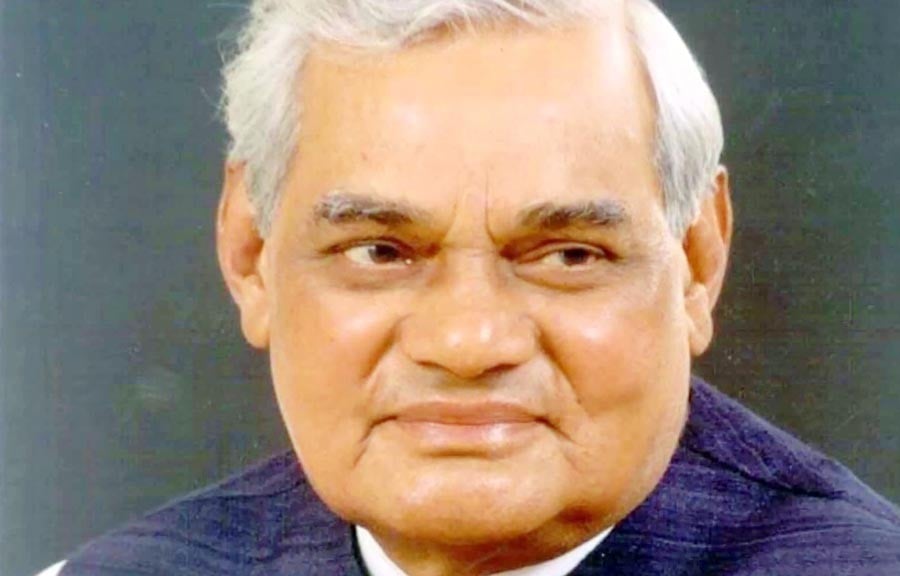
History must remember Atal Bihari Vajpayee as a man of peace with the soul of a poet -- a reconciliation man in the garb of a Hindu nationalist

All the guests at the Deputy High Commissioner’s (DHC) dinner told me it was going to be a tall order. I had arrived in Delhi on the eve of the SAARC summit on December 31, 2003 to interview the Indian Prime Minister Atal Bihari Vajpayee for PTV.
His trusted National Security Advisor Brajesh Mishra had organised the interview for me. It was going to be an exclusive interview and there was speculation that India’s Prime Minister might make a positive statement about engaging with President General Pervez Musharraf, the army chief who had led the disastrous Kargil Operation and sabotaged the potentially positive outcomes of the Lahore summit.
Brajesh Mishra had already indicated that Delhi felt they could do business with Musharraf because the intelligence chatter of the mujahideen picked up by India’s military intelligence had suggested that they saw Musharraf as a foe who would hand them to the US intelligence.
Upon arrival I was informed by Vajpayee’s staff that I would not get even ten seconds more than eight minutes to interview the prime minister. The dinner conversation at the Pakistani DHC revolved around the fact that Vajpyee was not a television personality, how he resisted giving television interviews and how the interviews dragged because of his long pauses.
But I had no choice. The interview for which I had travelled all the way from Islamabad had to be done.
The following morning the interview took place and I returned home with a major scoop…the Indian Prime Minister had said he could trust Musharraf and do business with him.
Vajpayee was a relaxed man during the interview. After the initial greetings, our conversation opened with me praising his kurta. He returned the compliment with a smile and asked the cameraman whether his shirt looked okay on camera. The interview was concluded in about 12 minutes without a pause.
Vajpayee, a politician born in the fold of the Hindu extremist party the RSS, had matured into a pragmatic yet courageous and visionary politician, and indeed no less a poet. Nowhere were these traits more apparent than in his dealings with Pakistan. A committed peace-maker, Vajpayee believed in the Nixonian approach to mending fences and building bridges of cooperation with Pakistan.
Pakistan’s iconic Foreign Minister Agha Shahi recalled that he had called up Vajpayee, his counterpart in the 1970s, to let him know that the Pakistan-India talks were deadlocked over Salala Dam because of the intransigence of his Indian counterparts and Vajpayee had intervened to remove the stumbling blocks.
Indian Prime Minister Vajpayee led India’s nuclear testing in May 1998, accompanied unsurprisingly by harsh threats by Vajpayee’s Home Minister L. K Advani. By September, Vajpayee partnered with Pakistan’s Prime Minister Nawaz Sharif to chart new pathways to peace in South Asia. In October 1998, Vajpayee announced a "new era in Indo Pakistan cooperation is being opened."
This turnaround took place within less than 100 days of the nuclear tests, following which the bilateral relations had taken a steep dive. It went singularly to Vajpayee’s credit that India’s friendship with Pakistan became the agenda of India’s Hindu nationalist party. He placed trusted men like Brajesh Mishra and Foreign Minister Jaswant Singh in key positions who led the hawks in Delhi’s South Block on the Pakistan-India normalisation path.
In fact it took both the prime ministers ‘legitimacy theory’ and confidence to work through the obstinately entangled problem of Kashmir. Nawaz Sharif, as did Vajpayee, put behind them the chronic hostility and distrust that has virtually become part of the DNA of Pakistan and Indian civil and military bureaucracy. Both pushed for a paradigm shift. A successful Lahore Summit, however short-lived, was the outcome.
Vajpayee’s visionary leadership came through at the Lahore Summit in February 1999; he was keen to bury the hatchet with Pakistan. At a civic reception hosted at the Governor’s House in Lahore, Vajpayee was clear about peacemaking and dispute settlement: "When we are required to take hard decisions, you will find us resolute; you will not find us retreating." In response to whether India would be willing to concede the right of self-determination to the Kashmiris in India-Held Kashmir, he departed from the standard Indian response. Instead, he said "discussion is going on. It’s very difficult for me to say what solution will ultimately emerge. Wait for the outcome of the talks."
In Pakistan a Kargil clique emerged to hijack and indeed derail the landmark Lahore peace process.
In 2001 Musings from Kumarakom Vajpayee, obstinate about peace-making with Pakistan again repeated that "India is willing and ready to seek a lasting solution to the Kashmir problem. Towards this end, we are prepared to re-commence talks with Pakistan at any level, including the highest level, provided Islamabad gives sufficient proof of its preparedness to create a conducive atmosphere for a meaningful dialogue."
But Vajpayee’s dream of peacemaking with Pakistan remained unfulfilled. The reasons lay more in the impatience demonstrated by the Kargil clique but the Advani lobby at the Agra summit in July 2001 also undermined the Vajpayee-Musharraf efforts.
History must remember Vajpayee as a man of peace with the soul of a poet and a reconciliation man in the garb of a Hindu nationalist.